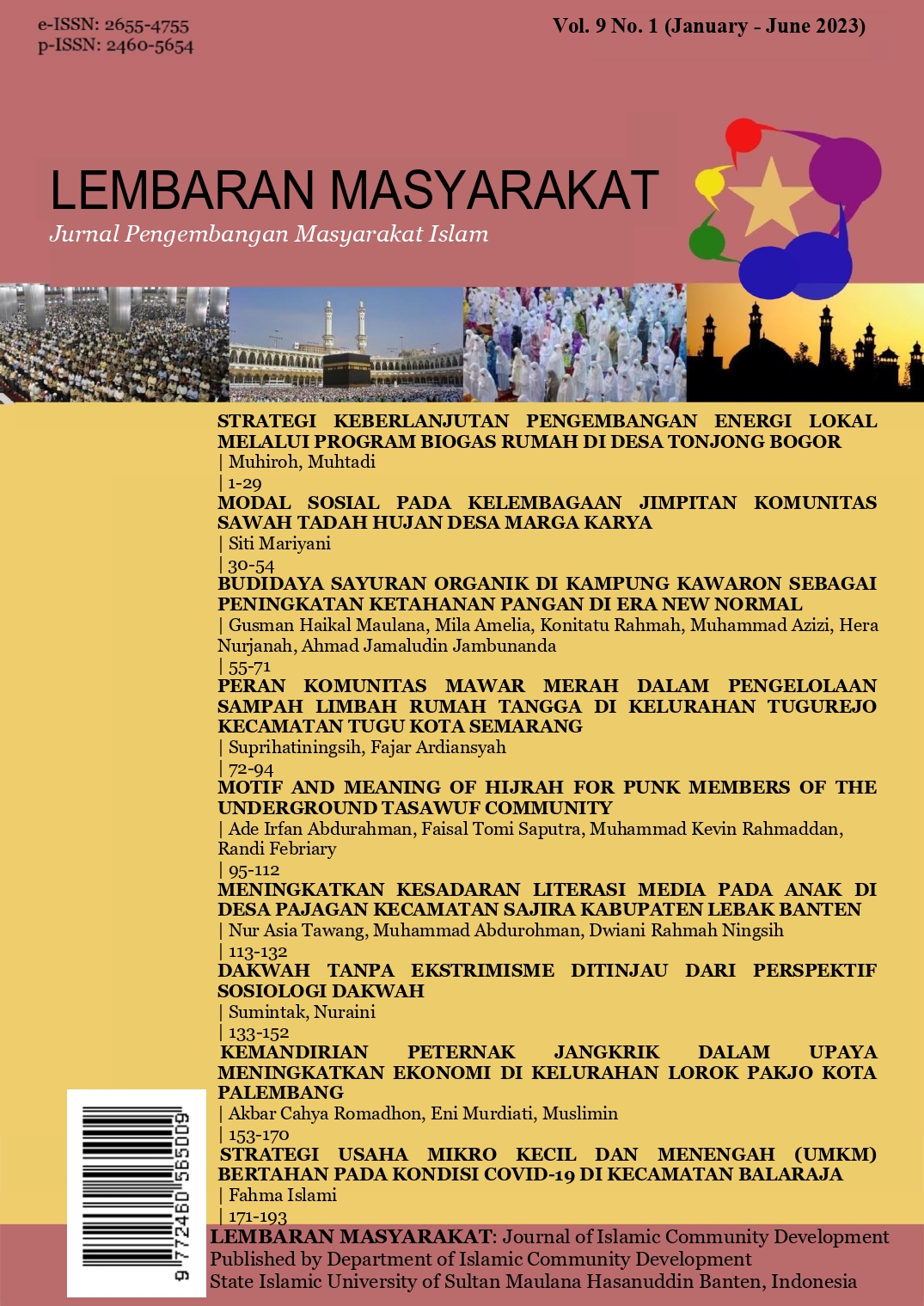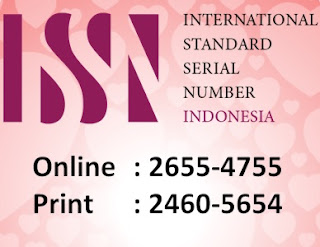DAKWAH TANPA EKSTRIMISME DITINJAU DARI PERSPEKTIF SOSIOLOGI DAKWAH
DOI:
https://doi.org/10.32678/lbrmasy.v9i1.8816Keywords:
Da'wah, Extremisme, Sociology of Da'wahAbstract
The increase in the da'wah movement in Indonesia is marked by many religious studies, but lately da'wah is often misunderstood in some circles. In the reality of everyday life, we often hear, read, and even see someone or a group feeling that they have done da'wah amaliyah. In fact, what is being done is still a lot of inequality, for example we see that there are still some cases of hate speech carried out by preachers which lead to the legal realm due to preaching that does not reflect Islamic values because they feel they have power in the form of authority to spread threats and hatred through da'wah. delivered to the mad'u, as if the da'wah of Islam looks very scary. This kind of situation must be immediately presented with Islamic da'wah models that save and soothe The research was carried out using a phenomenological-critical approach by looking at how socio-religious phenomena are in the reality of everyday life. Sources of data that are discussed in this study using library research obtained from books, journal articles, websites, and through reading on social media. Basically, da'wah is an obligation inherent in every Muslim, a strategy is needed in da'wah by developing several models of da'wah that are very relevant to the realities of social life in the era of globalization. This is done to make each of us aware that we can spread da'wah messages with kindness so as not to damage the good image of Islamic da'wah which provides peace and safety for all people.
Downloads
References
Ahimsa Putra, H. S. (2012). Fenomenologi Agama: Pendekatan Fenomenologi untuk Memahami Agama. Penelitian Sosial Keagamaan, 20(2), 280.
Alif, N., Mafthukhatul, L., & Ahmala, M. (2020). Akulturasi Budaya Jawa dan Islam melalui Dakwah Sunan Kalijaga. Al’Adalah, 23(2), 143–162.
An Nasher, M. A. (2015). Femnomena Kafir Mengkafirkan. Kompasiana.Com.
Arifani, M. A. (2010). Model Pengembangan Dakwah Berbasis Budaya Lokal (Analisis Tentang Akulturasi Islam dan Budaya Lokal Dakwah Sunan Kalijaga). Ilmu Dakwah, 4(15), 849.
Aripudin, A. (2016). Sosiologi Dakwah. Remaja Rosdaarya.
Ba-Yunus, I., & Ahmad, F. (1998). Sosiologi Islam dan Masyarakat Kontemporer. Mizan.
Effendy, B. (1998). Radikalisme Agama (H. Prasetyo (ed.)). PPM IAIN Jakarta.
Geertz, C. (1973). The Interpretation of Cultures. Basic Books, Inc.
Geertz, C. (1981). Abangan, Santri, Priyai dalam Masyarakat Jawa. Pustaka Jaya.
Giddens, A. (1990). The Consequences of Modernity. Stanford University Press.
Imam Subqi, R. A., & Sutrisno. (2018). Islam dan Budaya Jawa. Taujih.
Iman, F., & Luthfi, M. (2021). Front Pembela Islam (FPI) Pasca Pembubaran (Menelusuri Respon Aktivis FPI dan Masyarakat Umum Terkait Pembubaran FPI). AHI Press.
Majid, N. (1992). Islam Doktrin dan Peradaban. Paramadina.
Muhtarom, A. (2021). Menanam Kembali Moderasi Beragama: Untuk Merajut Kebhinekaan Bangsa. Teras Karsa Publisher.
Musthofa. (2016). Prinsip Dakwah via Media Sosia. Jurnal Aplikasi Ilmu-Ilmu Agama, 16(1), 51.
Neumann, P. R. (2013). International Affairs. Royal Institue of International Affairs 194, 89(4), 873–893.
Nuwairah, N. (2017). Dakwah di Tengah Keragaman Masyarakat: Hakikat dan Strategi. Alhadharah: Jurnal Ilmu Dakwah, 13(25), 16.
Permana, D., Wahyuddin, W., Wazin, & Rosyadi, S. (2020). Menanam Kembali Moderasi Beragama Untuk Merajut Bingai Pluralitas Hukum Islam (M. Ishom (ed.)). Teras Karssa Publisher.
Qardhawi, Y. (2002). Kebangkitan Gerakan Islam dari Masa Transisi menuju Kematangan (A. Hakam Shah & M. A. Abied Shah (eds.)). Pustaka Al-Kautsar.
Qodir, Z. (2013). Deradikalisasi Islam dalam Perspektif Pendidikan Agama. Jurnal Pendidikan Islam, II(1), 85–107.
Rantona, S. (2018, September 30). Fenomenologi Kritis: Komunikasi Lingkungan. Wordpress.Com.
Setyawan, A. (2020). Dakwah yang Menyelamatkan: Memaknai Ulang Hakikat dan Tujuan Da’wah Islamiyah. Al-Adabiya: Jurnal Kebudayaan Dan Keagamaan, 15(2), 189–199.
Singh, B., & Mulkan, A. M. (2012). Jejaring Radikalisme Islam di Indonsia, Jejak Sang Pengantin Bom Bunuh Diri. Gelanggang Press.
Solikhati, S. (2017). Simbol Keagamaan dalam Islam dan Ideologi Televisi. Islamic Comuncation Journal, 02(02), 127.
Sulanjari, Y. (2011). Retorika: Seni Bicara Untuk Semua. Siasat Pustaka.
Taher, T. (1998). Anatomi Radikalisme Keagamaan dalam Sejarah Islam (H. Prasetyo (ed.)).
Tajiri, H. (2015). Etika dan Estetika Dakwah (I. T. Nugraha (ed.)). Simbiosa Rekatama Media.
Tajuddin, Y. (2014). Walisongo dalam Straegi Komunikasi Dakwah. Addin, 8(2), 367–390.
Zada, K. (2002). Islam Radikal, Pergulatan Ormas-ormas Islam Garis Keras. Teraju.
Downloads
Published
Issue
Section
License
Copyright (c) 2023 Lembaran Masyarakat: Jurnal Pengembangan Masyarakat Islam

This work is licensed under a Creative Commons Attribution-NonCommercial 4.0 International License.









.png)
.png)
.png)

.png)











